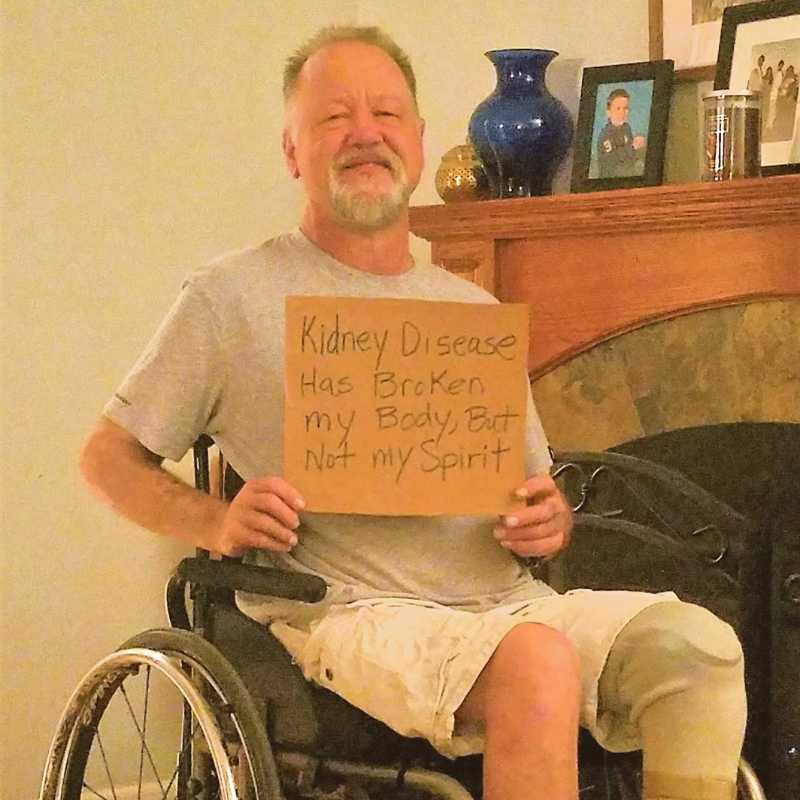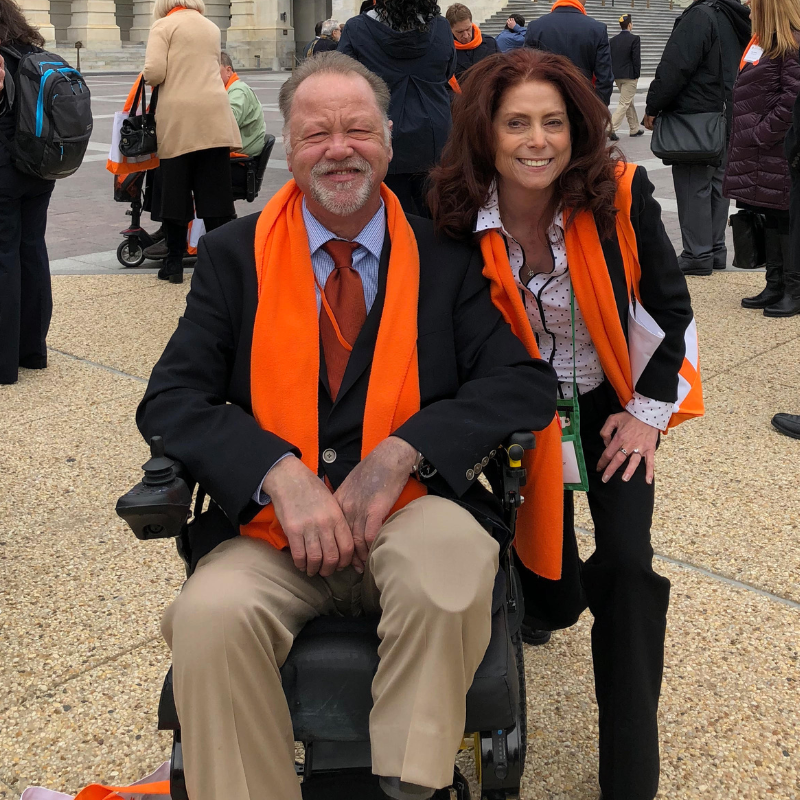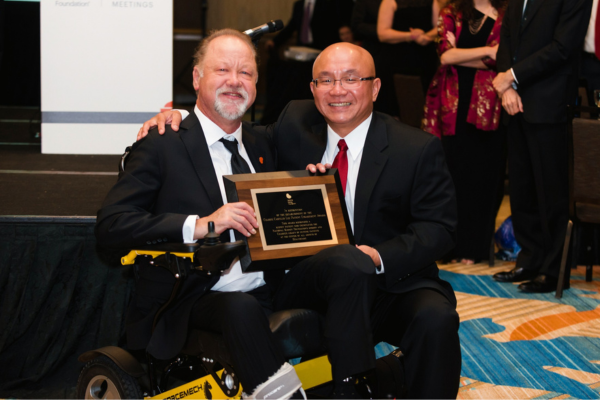May 30, 2023
Derek Forfang's journey with kidney disease has been a long, winding road filled with anxiety, depression, and heartbreak. Even after receiving one pancreas and two kidney transplants, Derek's battle was far from over. Despite all the challenges he continues to face, Derek has remained determined to thrive, not just survive.
Now he uses his experiences to help others going through similar struggles.
Derek's kidney disease journey

Derek was only ten when he was diagnosed with type 1 diabetes. In the 1970s, there weren’t the same diabetes monitoring tools we have today, so he had to guess his blood sugar levels based on how he felt. Not knowing his numbers made him anxious, and this guesswork wasn't perfect, leading to substantial kidney damage by his mid-twenties, when doctors discovered a high amount of protein in his urine, a sign of kidney disease.
"Right after that discovery, I changed insurance companies and went to a different doctor who never mentioned it again," said Derek. "I moved to Texas and was recommended to a hospital doing pancreas transplants. I had the chance to not have diabetes anymore. While getting tested for the pancreas transplant, I found out I was heading towards kidney failure."
Derek got the pancreas transplant, believing it would help mitigate the damage diabetes was causing his kidneys.
"I got the transplant, but it rejected. I needed a lot of steroids and other drugs that made my kidneys fail even faster," Derek said. "Soon after, my father was getting prepared to give me one of his kidneys. There were only six weeks until surgery, so my doctors tried to hold off dialysis but I ended up crashing. I went to the ER and started emergency dialysis."
Finally, the time came for the kidney transplant surgery. While complications are a rare occurrence, the surgery didn't go as planned.
"I almost lost my dad. He had blood toxicity after surgery and his organs started to go necrotic, dying inside of him," said Derek. "He was comatose for a few days but did come out of it. He ended up on dialysis in my chair for six months with only 30 to 44% kidney function returning.”
Despite his father's insistence that he would have donated all over again even knowing this outcome, this devastated Derek. Sadly, the kidney only lasted three years, and Derek spent the next twelve on dialysis, unable to ask anyone else to take the same risk. Learn more about the risks of surgery.
"When I did get the second transplant, my brother-in-law was getting worked up to donate through a paired kidney chain. He lost weight and got in shape but I got a deceased donor's kidney anyway," said Derek. "I did chemo for six months to lower my antibody count and decrease the risk of it rejecting. When I did get the transplant, the kidney was a sleeper. It didn’t work right away so I had to do dialysis until it started working or woke up. During this time, I had a heart attack but was able to go home a week later. It's been ten years since that transplant."
Despite this gift of life, it hasn't always been smooth sailing for Derek.
"I've had some complications over the years. I'm in a wheelchair because I had an amputation below my left knee and some of my right leg," said Derek. "I still have problems with my legs so it's always a journey. It's a lot of trying to figure out how to cope with what's going on."
Do you need support? You aren't alone! Join NKF Peers, our peer mentoring program that connects you with trained mentors who have been there themselves.
Learning to cope

Throughout Derek's journey, he dealt with anxiety and depression but didn't want to follow the same path as his grandfather and mother. Both struggled after their diagnosis of diabetes, kidney disease, and eventually kidney failure. His grandfather even had a leg amputation and experienced a heart attack before passing. Learn more about dialysis and depression.
"My grandfather passed away before I was diagnosed with kidney disease and my mother lost her kidney function when I was in end-stage. Neither of them did very well adjusting to dialysis and dealt with a lot of depression," said Derek. "It was a huge change and really hard for them. My grandfather was on dialysis for four years before he passed in his mid-sixties. My mother was on dialysis for one year and passed at sixty. I was going through the same things."
So how did Derek cope?
"I started therapy when I was 10 years old. I had a lot of support from my parents who shared that it was okay to ask for help. I've touched in with therapists across my whole journey and found it very helpful," Derek said. "There was a period of time where I had a lot of anxiety and was given an anti-anxiety drug for a period of time until I got through it. The anxiety is less now because modern medicine lets me see my blood sugar at any time."
Derek also struggled with the idea of amputation because of the increasing similarities between himself and his grandfather.
“I had heart problems, was on dialysis, and about to have a leg amputation–the exact pattern as my grandfather," said Derek. "I was struggling so I talked with a healthcare professional about it. She explained that all people are different. I'm not my grandfather even if we had a lot of similarities."
Since then, Derek has dedicated his life to helping others with kidney disease and encouraging them to get the assistance they need to live a happy, full life.
"You shouldn't be ashamed to use mental health tools. We've been put in an extremely difficult situation. Some people are lucky to get a transplant first but it's still a big life transition," Derek said. "It's like you've painted a picture of your life and now it's torn down. You have to repaint it. Therapy and medication helped me do that. If you do feel hopeless, reach out and get some help. It gets easier to ask for help over time."
Join a kidney community where you can share your experiences and ask questions to other people living with kidney disease.
Repainting his picture

After Derek's first kidney transplant failed, he had to quit his job but desperately missed the interactions he had while working.
"I used to be a purchasing agent, so I traveled and did a lot of networking and negotiations. I'm a real people person and enjoyed that part of the job. I'd volunteered as a kid so I thought it might be a good way to start repainting my picture," Derek said. "I became a chair of the ESRD Network and had the opportunity to join the national team. My work skills and connections with the government really helped me in that position. I even helped create their Dialysis Depression Toolkit."
Derek hasn't stopped there, though. He continues participating in various kidney health initiatives, including Voices for Kidney Health, NKF’s patient advocacy community.
"I started as a regional leader for the Kidney Advocacy Committee and agreed to lead a group to improve it. There were only 60 people and now we have close to 400. It's so rewarding to watch it grow and see all the things we've been pushing, like the immunosuppressive bill, get passed. I'm also chairing NKF’s Public Policy Committee and got the chance to work with the [Food and Drug Administration] and [American Society of Nephrology] on new novel therapies. I've been involved in wearable dialysis, the Making Dialysis Safer For Patients Coalition, and sit on the board with UCSF for their artificial kidney,” Derek said. “I was lost before. I'd lost my career which left a big hole in myself. I started feeling useless and realized I needed a sense of purpose. Now I have so much hope. Being an advocate saved my life."
Find your purpose–Become a Voices for Kidney Health advocate.


















